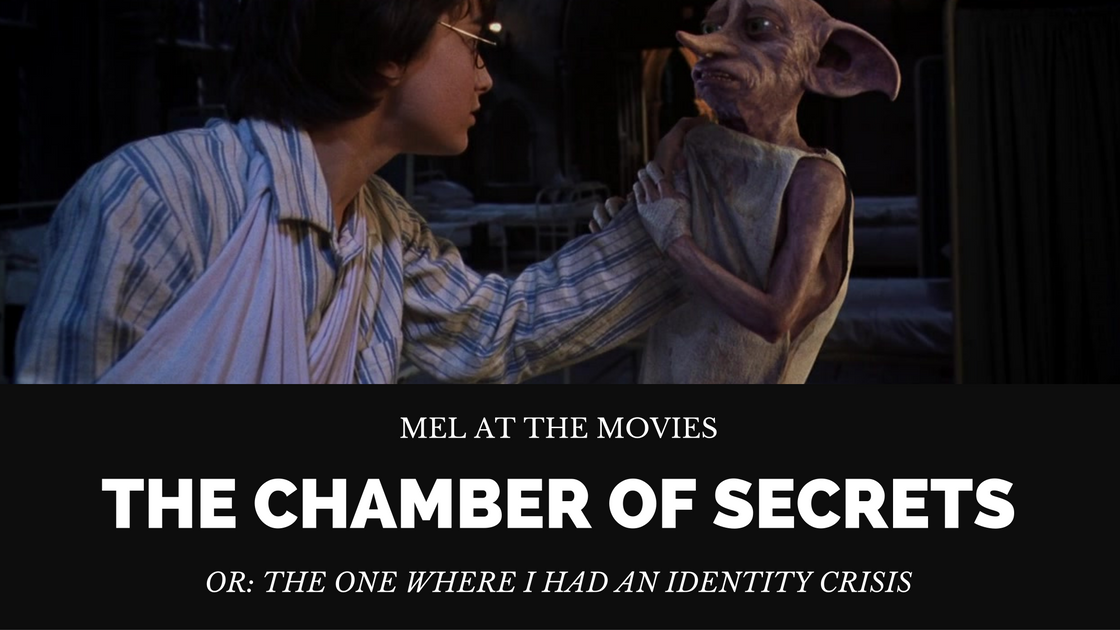
I just… ok. You guys. We’re going to dig into Harry Potter and the Chamber of Secrets in a minute, I promise. But I’ve got some questions that need an answering, folks.
I am having an existential crisis. After being told by dozens of nerdy friends throughout my life, and after having my little private sorting party alone in my office with a glass of wine, some sweet tunes, and no regrets… apparently I’m part of the super racist house? I would love to hear people’s thoughts on this. I have feelings.
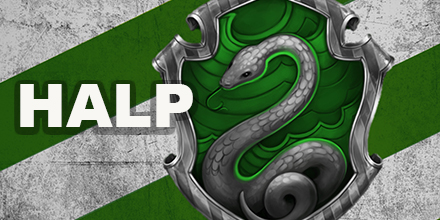
But of course, my lamentations into the ether can wait, as we have something far more exciting to discuss, specifically, Harry Potter and the Chamber of Secrets. So let’s jump right back in.
Now if you recall from my watch though of the first film, the Dursleys were a bit of an issue for me. Though due to the nature of it being the proverbial “sticking its toe in the water” in overarching historical importance for set up, I was willing to let a few things fly.
Harry Potter and the Chamber of Secrets starts right back up with the Cinderella-boy framing device, now with a massively diluted version of happier ever after. Harry has a room now, good on him. And yet we are still clinging to the need for the Dursleys’ cruelty. Harry knows he’s a wizard, the wizarding world is aware that he is alive and well and attending Hogwarts, heck even the big bad knows what’s up at this point. There is no protecting him from the powers that be through the use of muggle cloaking. So I can’t help but wonder what the point of sending Harry back to these still mostly terrible conditions is. Not to mention these people are respectively living with a live cannon. No new information or analytical reading could really be drawn from this sequence, which overall, could be considered a bit sloppy. The only thing that I can draw is that these people must eventually be important, but for now, lingering on them is proving exceedingly tedious and ultimately useless.
However, while I thought that dealing with the Dursleys was the most annoyed I could get with the film, apparently I was staggeringly amiss.
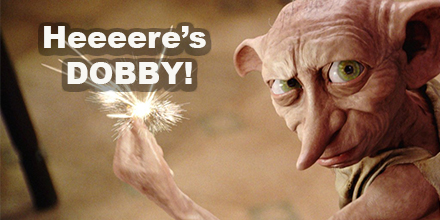
You guys, how have I, as a human woman on the internet, gone this long without knowing that Harry Potter had an actual Jar Jar Binks? Why does nobody talk about this?
Upon the first and rather sudden appearance of Dobby, all I could ask aloud into the void of my apartment was, “What’s that weird cat?”. It is soon revealed that he is in fact a house elf, a creature of servitude for wizard families. Or you know, a class system typification. As much as I personally found this character wildly insufferable, banging his head against various items and incessant wailing as if he were a Mean Girl with a bad haircut about to be late for the prom, I did appreciate the acknowledgement of an upper English class system that was, once again, outdated. Very similar to what we saw in the first film with young Draco Malfoy, there seems to be a group of post-first war families that still believe the class system is alive and well and living in Droitwitch. Because of its archaic nature, the inclusion of Dobby gives an even further hint of upper class barbarity, which adds some nice, underlying texture. There is also something to be said about the construct of an elven creature that doesn’t look like it’s a model participating in a walk off against Derek Zoolander. Kudos to you, Ms. Rowling, for thinking outside of the traditional fantasy box on that one.
Thankfully, before this obnoxiously Gollum-voiced CG monster completed his task in sucking the life-blood out of my enjoyment of this film, the Weasleys show up in the most stereotypical teenage fashion; they have stolen their parent’s car.
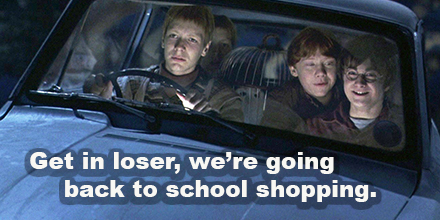
Thankfully the use of this car assuaged my fears that the CGI in this film would be atrocious. There is actually a great balance of practical effects throughout, which always tickles me so when I see it used well in film.
I was then introduced to the unexpected setting of Mumford & Sons combined with the animated “The Sword and the Stone” film, aka the Weasleys’ home. After “Harry Potter and the Sorcerer’s Stone” threw a lot of the childlike fairytale elements to the wind, this seemed like a bit of a departure for Chris Columbus to have created such a fairytale looking house, though that may have been through the dictation of the books. A lot of this portion felt like childlike set dressing, as I could not glean any real introduction to the plot yet. Here magic is more of a charming day to day, and applied in more of that Disney princess format that I had been hoping to avoid. The father is obsessed with muggle things, which seems to be taboo, but that was about all I could take away. Thankfully the Weasleys as a family are charming, exceedingly British, and make the fairytale device transition a little more lubricated.
Their exceedingly British-ness is only amplified through the device of Floo Powder. It’s England, of course chimneys and proper enunciation are super important. Just ask any Marry Poppins.
And just like that, we are transported back into what I would consider, you know, the plot of the film. And into a weird murder house no less!
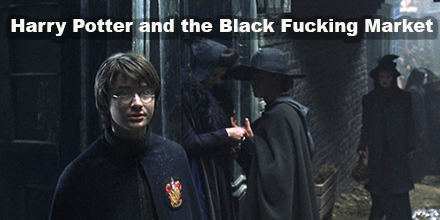
Through a cleverly placed plot device, young Harry finds himself in Knockturn Alley, the exact opposite of the Weasley house. After a series of inanely bad decisions made in the form of touching creepy shit, we as the audience are given a very interestingly shot little scene of two adults having a “How sinister am I?” face-off. A Denis O’Hare look-a-like speaks to an actual Disney villain man, viewed by Harry in a style that if you threw a black and white filter over it, is remarkably reminiscent of a scene with SS Officers from “Schindler’s List”. And with that, my previous translation of these films seems to snap back into place. Not to mention, we are getting yet another scene of children learning about the underhanded dealings of adults through secret observation, which seems to be a continuing theme.
But as quickly as you can say “Jason Isaacs where have you been, I’ve missed you being in movies”, we are whisked into the actual alley itself, filled with the darker side of Dickensian despots. A wild Hagrid appears, urging young Harry that this is not a place he should be seen, which prompts Harry’s most insightful questioning to date: why is Hagrid there then? A flimsy “never mind all that” excuse is given and we’re back to adorable school shopping.
I then received the pleasant surprise of meeting yet another new character. Kenny Branagh bursts onto screen with the loud “look at me” passion of a man still furious about his ex-wife winning the Oscar. A little older than I think the character was supposed to be, but he makes up for it in dripping social desperation that pairs so nicely with the odd and vibrant Gilderoy Lockhart.
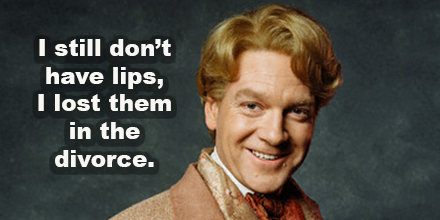
In a brief but well done moment, we are shown the full extent of why everybody who’s not his immediate friend might hate Harry Potter. The young man is immediately swept into Lockhart’s purview, being shoved in front of a camera and gifted a special set of signed books. As his friends who are struggling to make ends meet watch on in awe, Harry is once again elevated above all others. Bolder than his still glaringly favored treatment by Hogwarts teachers, he is put into the spotlight of being some sort of magical triumph that should revered, even though he hasn’t actually done anything except stay alive as a baby. The details on how/why he is important are still wildly unclear to the film viewer, by the way.
Side note, this holds the potential for some very interesting character development. There is something almost Superman-esque to be said about the boy who’s been told he’s a beacon of hope all his life and treated as something to be cherished by the entire world before he even came into his power. I’m curious to see what happens as he grows up and is eventually told the word “no”. I have always found the most interesting alt-verse Superman stories to be the ones where he doesn’t understand why the rest of the team isn’t listening to him because after all, why would you not, he’s Superman. Think the good intentions of the Red Son Superman, or the Lex Luthor presidency issues in “Public Enemies”. It comes from a place of innocence but can often lead to catastrophic devastation. I’m curious to see what kind of complex Harry is developing here.
Thankfully, here comes Draco to knock Potter down a few pegs, keeping that mystery complex at bay for at least a few more films. He is also joined by the previously seen Jason Isaacs, who I guess is also his father. You can tell because they both look like they belong in the same high-end European shampoo commercial. He proceeds to be extremely touchy, making a few flippant upper class comments about wealth and status before mic-dropping a racist bomb while discussing Hermoine’s two muggle parents.You could literally put Lucious Malfoy next to Lord Darlington from “The Remains of the Day” and I’d have a very difficult time telling them apart. British Nazi-sympathizer is written all over this guy.
Anyways, we’re done with school shopping and racial allegories and back to the train, which due to complications leads to yet another car theft. Complications is a clever euphemism for “that shit house elf” by the way. His presence isn’t exactly subtle throughout this film.
Also, if Ginny Weasley doesn’t steal that damn car at some point in this series, completing the shitty teen Weasley family tradition, I feel that someone’s really dropping the ball.
But we get to Hogwarts, there’s a wildly unsafe tree creature involved, and we are led to believe in a shocking turn of events that this magical hybrid car is apparently sentient, which raises a wildly mountainous slew of new questions from me, but that’s a whole other article.
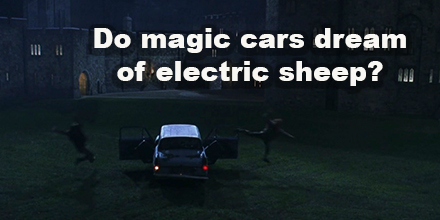
The result of this though is that the magical world is temporarily exposed to the muggle community. Or, if we’re looking at this from a historical POV, a community at ill-ease has had their conflicts exposed to an unsuspecting audience. The community of non-magical humans live at the bottom of this social food chain, clouded by a perpetual mist of “never mind all that”. The Dursleys are a perfect example of the worst parts of what that community would have to offer with this knowledge. It’s almost a throwaway moment, but it held some interesting resonance for me.
And now, back within the sacred walls of an ancient school ground, we finally get to some of that interesting post-WWI metaphor stuff I like so much. This school year held two new interesting facets that directly relate to this.
The first is that the students are being actively prepared to weaponize themselves. Gilderoy Lockhart, despite clearly not being liked or hired by any of the current staff, has a job at Hogwarts as the new Defense Against the Dark Arts teacher, yet he plays himself as more of a war hero than an adventurer. By starting a dueling club, which is remarkably reminiscent of fencing with the framing manners of pistol dueling, the children are actively encouraged to challenge and fight each other, despite the clear lack of boundaries when it comes to the injury of others. Very reminiscent of the old “Victory Corps” that were developed in the 1940s at boarding predatory academies across Europe, where children were encouraged to participate in war-oriented extra-curricular activities. Unlike something like a sporting event, neither professors seem to really want to curb aggression for safety. Snape seems to be actively looking out for the strongest soldiers.
Not to mention that Quidditch in this film really just became a series of nut punch jokes.
The second is that the violence of the world has finally come to Hogwarts. Imagine coming into the halls of your high school one morning to see that people you know and maybe even enjoy, have been ostensibly curb stomped into a coma under the proverbial flag of racial superiority. Does this sound vaguely or upsettingly familiar? Racial slurs begin popping out of children’s mouths at a far more frequent rate. Oh, and there’s new blood threat messages as a part of new campus decor. The school is no longer safe and ultimately, those who would try to keep the children safe can no longer keep the horrors of a war on the brink at bay.
This leads to a lovely round of whodunit, where that backend of special treatment starts to come up and bite Harry Potter in the butthole. There is reasonable evidence, such as speaking parseltongue, which just SOUNDS like a German sex act, but it seems that the bulk of the school is ready to see young Potter fall from grace. You’re all thinking that one Dark Knight line, I don’t need to say it.
What is also the most interesting with this transition, is that the teachers do not present a world of heroism and standing up to those who would perpetuate this mentality. No one really stops any of these younger students from actively harming each other, or from saying the M word. As a result, it’s teaching the students how effective fear is, even on the adults. I hope this gets delved into later.
As a direct result of this violence though, we get something from the plot that I was sorely missing in the first Potter film, specifically, some answers from the adults. The golden trio essentially has to ask about the history of the previous war and the adults can no longer hide all of it. They explain about the Chamber of Secrets, or you know, a literal chamber filled with the purpose of cleansing those with impure blood.
And with this dramatic spike in violence, the magic is required to up it as well. The children have the history to work with, but not the means. As a result, we begin to see that childlike experimentation that comes with not knowing one’s boundaries. Like a few “responsible” kids left home alone for the weekend with an unlocked liquor cabinet, Hermione and the gang begin messing with spells a little out of their range, the result of which is “Spy Kids” meets a bad after school special.
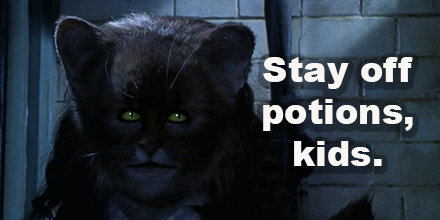
But speaking of “Spy Kids”, welcome to the third act of this movie. Through a series of highly James Bond style spy devices (disguises, invisible ink, mirrors to peak around hallways, and secret messages with a pen pal for example) the children proceed to Roald Dahl their way around the castle. English stylized espionage tactics used in WWII are rampant during this particular section.
The secret pen pal, Tom Riddle, immediately becomes a most trustworthy figure to Harry for two distinct reasons. One I would argue is age. It is far easier to relate to someone around your own age, especially with such a similar, “I have nowhere else to go”, backstory. There is a clear division in this film between young child and wise elder, with no real relatable middle ground of character, such as a prominent parental figure. Due to the subterfuge and larger than life nature of the Albus Dumbledore character, we still have yet to see a real, truly relatable parent figure for Harry, as compared to just a wise old man figure. He literally has a Link and Old Man sequence in this film where they talk about birds in a cave office.
The other reason is that in Harry’s mind, Tom Riddle is the first character to relay relevant, important and provable information to Harry with the purpose to help him survive. Not only that, he doesn’t just tell, he shows. He creates a very visceral, relatable experience for Harry. Dosed in a sepia filter usually reserved for war scene flashbacks, Tom shows Harry proof of something that he already knows, that the adults in his life are liars. Whether or not those lies are true in this circumstance, it flows right back into what he has seen, experienced and learned since being indoctrinated back into the wizarding world.
And as a result, he’s learned to lie to them, which he promptly does to Dumbledore.
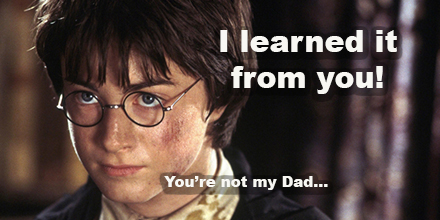
Due to information from Riddle and some sneaking around with the Peeping-Tom cloak, we are given a sequence revealing the purpose of the mass exodus of spiders from Hogwarts.
Small side note, if you’re not a fan of, oh I don’t know, giant flipping spiders, this scene was unexpected, profoundly sweat inducing, and incase you haven’t guessed by now I DON’T FLIPPING LIKE SPIDERS, OK? That being said, this was a vastly fascinating inclusion so we’re going to talk about it anyway.
Despite my having to watch through cringing eyes, Aragog rang true of a very interesting piece of history for me. Evoking this very wild and exiled camaraderie the spiders reminded me of the Romani persecution pre-WWII. Preceding the Nazi takeover of power in 1933, this was a group that had essentially been divided into a clan mentality due to previous European persecution, many of whom began running because they knew that as a dark power rose, it was only going to get worse. The result was attempted exodus, camping out as clans in the woods to hide so as not to be brought into early versions of what would become known as internment camps. Aragog, voiced by the impeccable Julian Glover of “Star Wars”, “Indiana Jones” and now “Game of Thrones” presents an alternate version history to what Harry had been physically shown, an interpretation from the side of the previously persecuted, because in an important lesson, history is often written by the victor, not the victim. This perspective is something that no one in the castle, or as I read it, no one from the first war, could have given him.
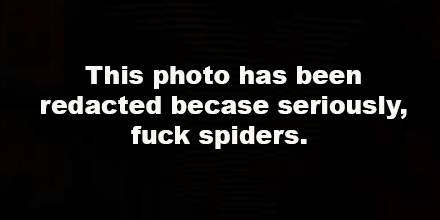
But after a quick bout of trying not to be eaten by multi-eyed venom death monsters and eventual saving by what I’m going to just refer to as the Blade Runner vehicle, we’re back at the castle and looking for a death chamber. You know, like how 12 year olds do. But this time it’s because the most adorable ginger child in all the land, Ginny Weasley, has been taken. The allotted chaperone that the professors assign is, of course, the illustrious Kenny Branagh.
They discover the door, Harry gets awkwardly hit on by the most adorable ghost lady, and now its tunnel time. Kenny is quickly dispatched due to some very nice payoff from an ongoing broken wand joke, and of course it’s Harry left over to go on to the Chamber of Secrets.
I should note here I can maybe see why I might be a Slytherin, despite rampant Nazi overtones, because I kind of want to be a wizard architect if this is the kind of shit I get to design.
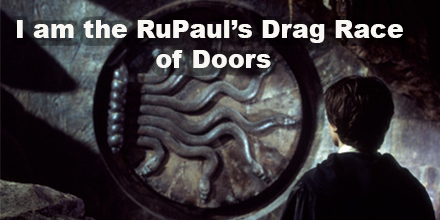
But we get to the aforementioned horror chamber to find another very unexpected metaphorical treat for the audience. Not Tom Riddle being Lil’ Voldemort, that part was clear. But throughout his villain monologuing, he explains how he manipulated Ginny into doing his bidding, and how even when she began to feel uncomfortable with what he was asking her to do, he had complete control over her. I can’t think of a better example of an abusive teenage relationship. You have the first year Ginny and the clearly older, I would guess senior year, Tom Riddle. She shares her hopes, fears and dreams with him, and over time through a use of subterfuge and manipulation, he talks her into performing things she is not comfortable with. It is not lost on me that a high school women’s restroom is a pivotal spot of disclosing and discovering secrets in this film. He even goes so far throughout his monologue as to continuously call her “silly little girl”, which I read as something he would probably tell her to remind her that she had no friends and was beholden to him. In many ways, I wish we had gotten a chance to see more of Ginny’s journey as this story unfolded.
But, it’s not called Ginny Weasley and the Chamber of Secrets, so of course all of this information is relayed over her passed out body as two dudes talk about their feelings.
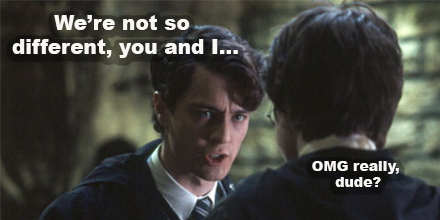
Tom makes the fantastic point of asking the question of what makes Harry so special. It was genuinely appreciated as I have yet to figure this out. We then hit the point in the film where I can only assume they ran out of “giant fucking snake” budget, as a deus ex machina bird shows up to have a shadow fight with the Basilisk as Tom Riddle gives us play by play commentary.
Harry gets a sword from the bird, because sure, why not. Wham, bam, thank you ma’am, we got ourselves win number two for Harry Potter.
We get a nice little scene in Dumbledore’s man cave where that sword that came out of nowhere gets a brief explanation, which if you’re a film-only watcher was like hearing the punchline before the joke.
Lucious Malfoy makes an appearance, receiving the greatest eye-level power lighting since Bela Lugosi. But a sneer, an overly punctuated “Potter” remark, and a quick book toss then reveal the answer that has been squatting on my brain like some kind of squid since I began this series.
Apparently socks get rid of Jar Jar Binks, you guys. And that is the most noble purpose a thing can possibly have.
This film, comparatively to the first one, was actually far better paced. It did exactly what you would expect a sequel to do: get you to the next story. While the first film seemed to be more about world building, Harry Potter and the Chamber of Secrets seemed to be trucking along to get you to catch up to the plot. I’m hoping by film three, we shall see a final balance between the two. Also, as we’re moving forward into full Hitler allegory territory here, I’m curious to see how humanity plays more into it.
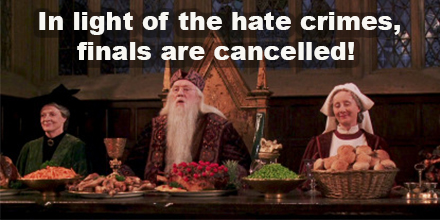
Final thoughts going into the next watch:

But there we have it! I hope you guys had fun and I can’t wait to see you all next time for “Harry Potter and the Prisoner of Azkaban”!
Check out more instalments in this journey below!
- Mel at the Movies: A Harry Potter Experience
- Mel at the Movies: The Sorcerer’s Stone
- Mel at the Movies: The Chamber of Secrets

![[REVIEW] SELENA: THE SERIES KEEPS SELENA’S HUMANITY A MYSTERY…](https://geekd-out.com/wp-content/uploads/2020/12/selena-season-2-1607111713-150x150.jpg)
![[PODCAST] IT’S MARVEL MANIA](https://geekd-out.com/wp-content/uploads/2017/10/comics-agenda-banner-150x150.jpg)

One thought on “Mel at the Movies: Harry Potter and the Chamber of Secrets”